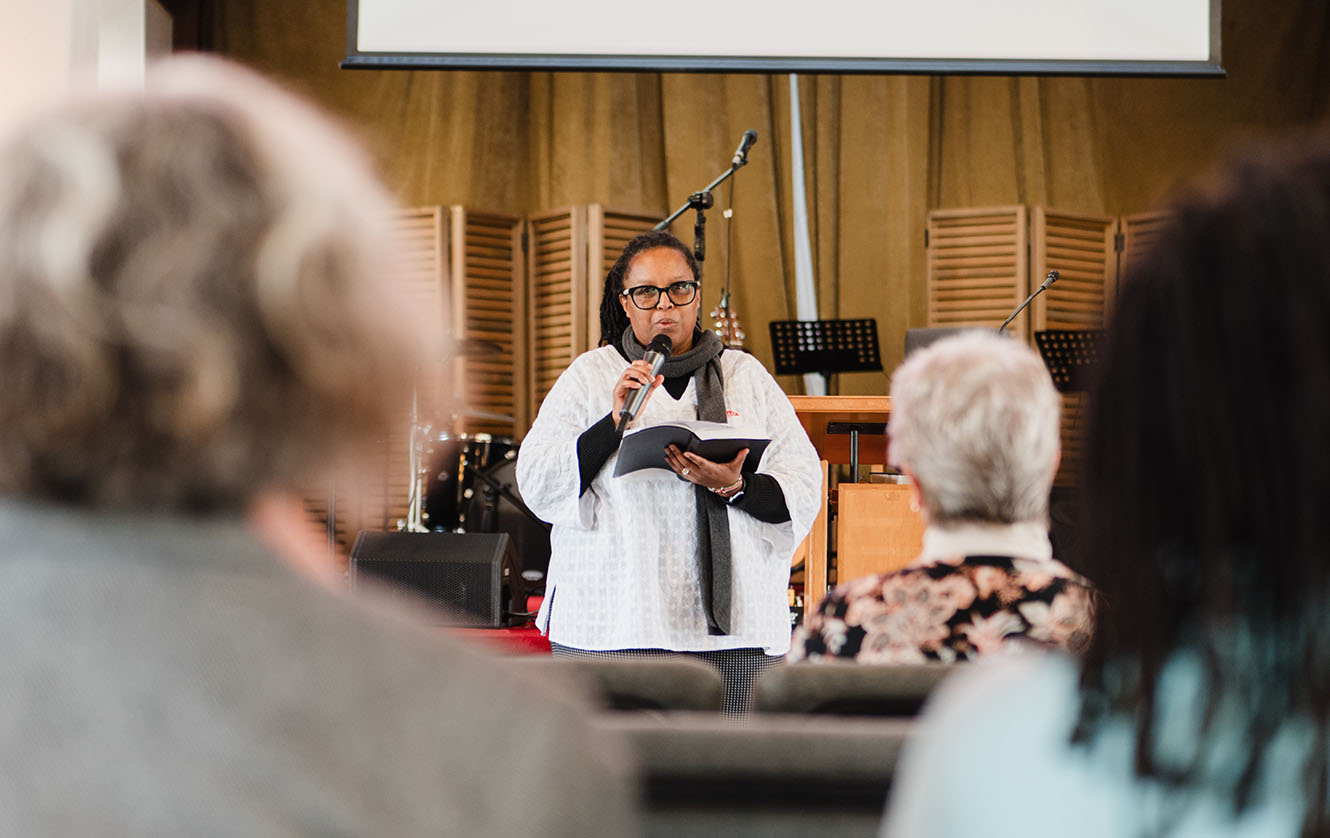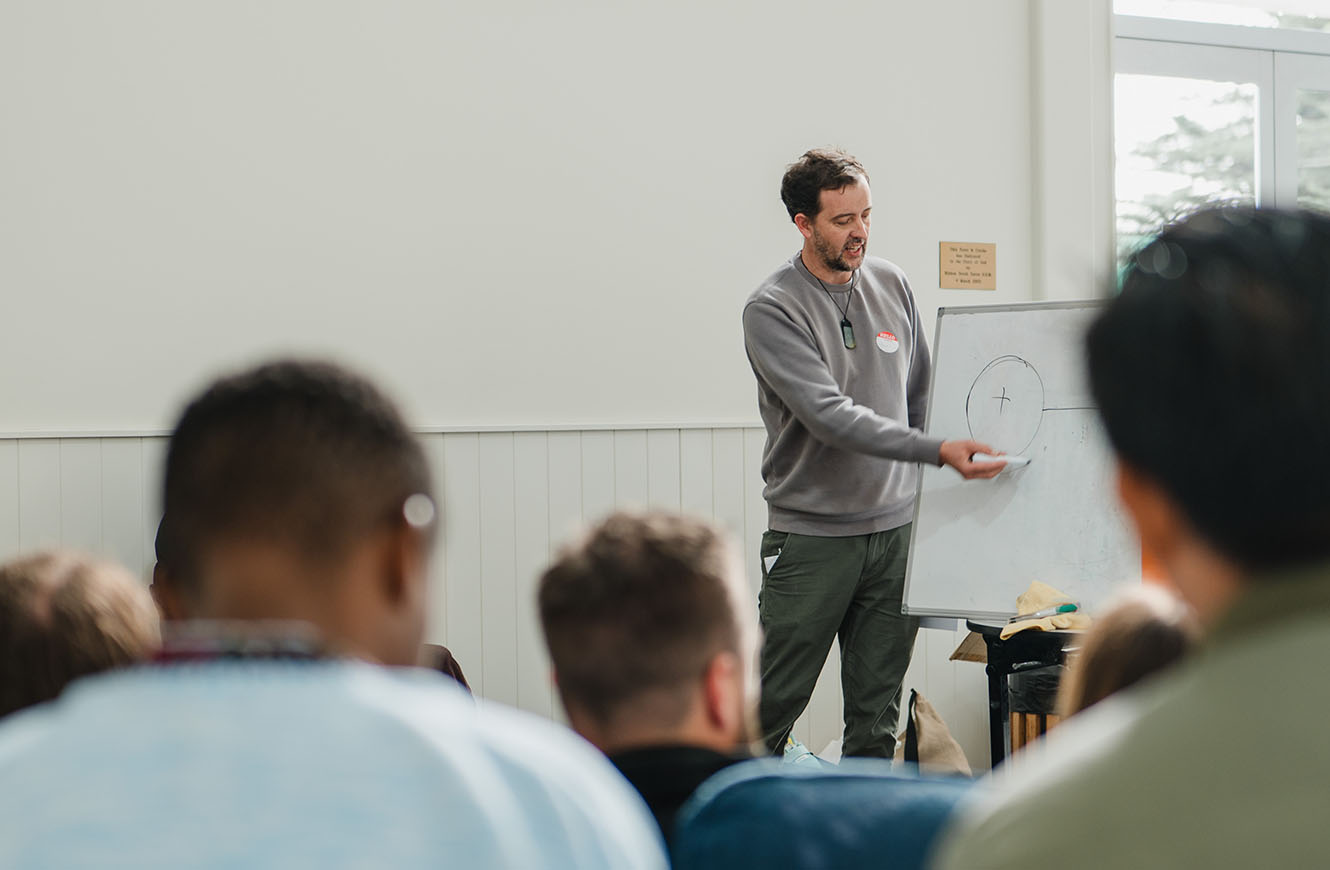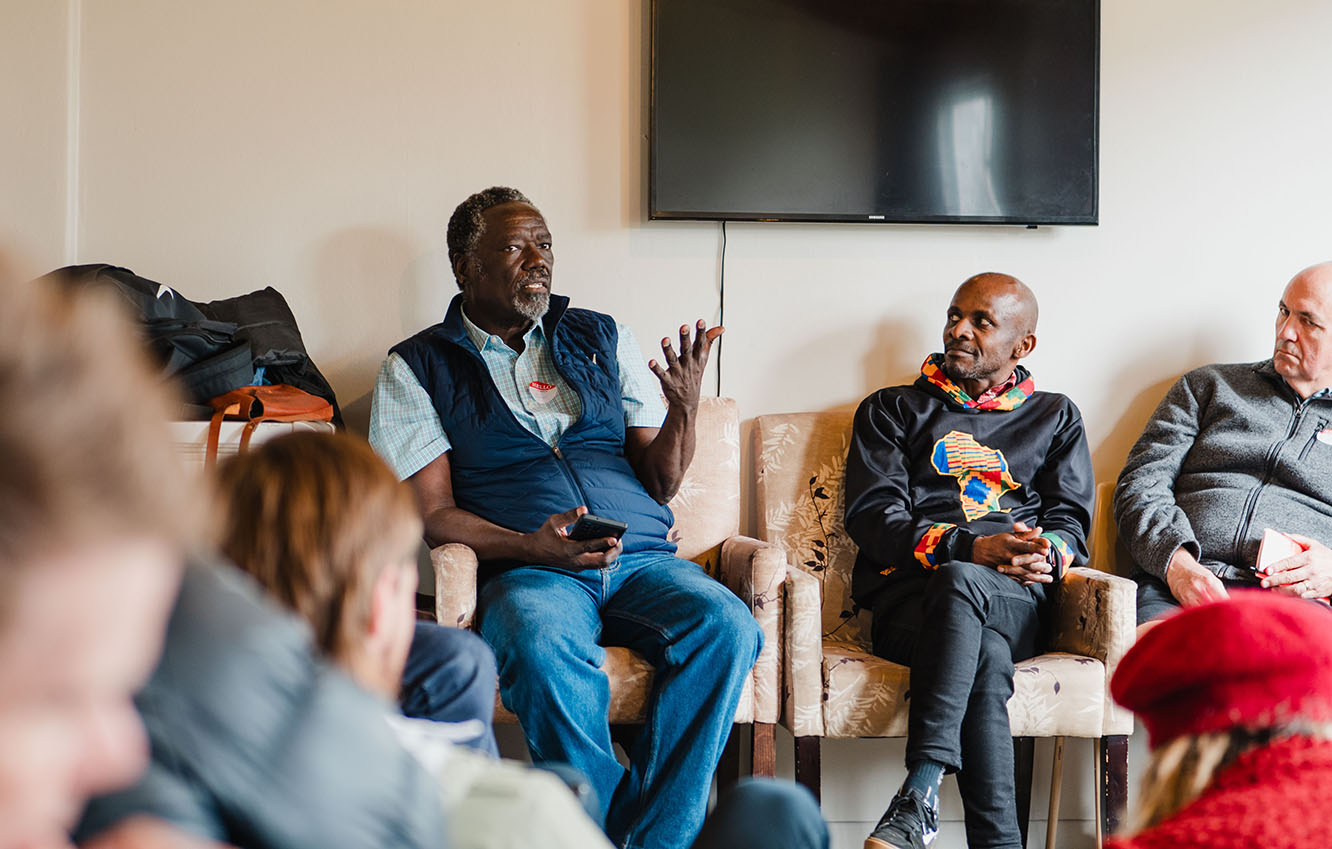
For all the wonderful things there are about elective workshops, there’s an unfortunate downside: you can’t attend them all.
Or, if you don’t live near Nelson, you very likely didn’t attend any after the heavy rains caused a hasty rearrangement from a three-day camp at Lake Rotoiti to a two-day event at St Barnabas, Stoke. All of the keynote sessions and Bible studies are available to watch online, but the workshops were in-person only.
That’s why I talked to some workshop attendees!
What insights are still lingering three weeks later for those who went to Leadership Camp?
That was one of the big messages many people walked away with after attending Watiri Maina’s workshop on women in ministry. Part of the discussion was around the tensions and challenges for women in leadership roles, which was eye-opening for both the men and women in the room.
“It was really useful hearing a woman's perspective on some of the unique challenges of being in ministry as a woman,” Samuel Oomen, Nelson, said. “Going along helped me to understand that a bit more – and, hopefully, will help me to be able to be more supportive and encouraging of women in ministry.”

Phillipa Adams, Motueka, also found it enlightening to hear about the resistance that’s still there for women in ministry and leadership roles.
My mother was a strong leader in the church, and had strong convictions that women should be in these roles, so I grew up with that kind of support, thinking that resistance was in the past or in other places. But there are still so many challenges for women in ministry, and it’s really good for those to be recognised and for Watiri to be in the role she’s in now, supporting women in leadership.
Alice Kinyua from Tāhunanui was “blown away by the number of people who attended. I wasn't sure the topic would pique people's interest but there's at least a curiosity if not a genuine need for it.”
You know a session is meaningful when it evokes conversations after the event. I had deep conversations during afternoon tea where raw emotions were shared, deep biblical questions asked and a few laughs exchanged.
Social services guru Jason Shaw led a workshop on community ministries. With strong local connections and practical experience, he brought grounded wisdom with compelling stats to back it up.
One model Jason talked about was Te Whare Tapa Whā – a building with four walls, which represent four facets of wellbeing: mental, social, physical and spiritual. It’s a popular model in both church and secular contexts. It helps to show that church ministries do actually play a vital role in the health of a community.
This is what Daniel Pluck from Stoke said:
A key takeaway was hearing that secular organisations, including government ones, are very open to working with us, especially when framed within the context of Te Whare Tapa Whā – where we can particularly assist in the spiritual area.
Michael Johnston, Wakefield, had similar thoughts:
My big takeaway from Jase’s workshop was the need to rethink how we understand what reaching the community as a church looks like and to be open to ways that are not what we are used to. The thing that has stuck with me the most is he shared that a study showed people are more interested in joining communities where there is a clear understanding of how they can help the community.

And for some, it sparked reflection on what it means to build a community of faith. As Rita Bell from Wakefield put it:
When I think back, my key takeaway was the huge importance of prayer to discipleship, so that we need to cultivate an actual prayer “culture” – and discipleship culture, I guess – in the Church to make them both happen.
We were immensely blessed by the presence and world-class wisdom of Bishop Oscar Muriu, who developed a trailblazing leadership development model at Nairobi Chapel. An early pioneer of church internships, his programme was revolutionary. Our very own Bishop Steve was once one of his interns!
In his workshop, Oscar shared the vision and practical steps behind this leadership pipeline. But he also spoke honestly about his own journey – and passionately! Kirsty Resink from Golden Bay said the room was “humming with God energy”.
My highlight was him describing the early days of his ministry as “fixing the car as it was driving along the road”. Something we definitely relate to in Golden Bay. I thought it was a description of ministry life that was full of grace and permission to keep being brave and messy while we are trying to do impossible things with God. It was also encouraging to be in the presence of a veteran who had learnt so much wisdom along the way. The fact that his whole message came back to intimacy and friendship with God was hugely refreshing for me.
“The primary goal of the first year of the internship was for interns to learn to love,” noted Russell Nimmo from Nelson, “I think it is worth pausing and reflecting on that.”

Nathan Hughes, Nelson, was struck by several things:
His determination to pour his life into people under 40. The fact that he didn’t wait for a perfect curriculum or pipeline – he just started and tweaked as he went. And his challenge to us: to honestly consider how much time we actually spend with the young people we’re involved with.
Rev Emily Holmes, Māpua, “found it helpful hearing how intentional his training programmes were, and how he gave responsibility, support and feedback to his leaders.”
This intentionality sowed into, and nurtured in them, identity and skills to lead in the way Christ had shaped them to with character to work within an authority structure, as part of a church family. And to be innovative themselves in God’s mission to the world.
We’re looking forward to more insights and good talks next year! But in the meantime, we’ve got plenty to mull over. Gatherings like the workshops at Leadership Camp are a good reminder that often the best learning is done together, through honest conversations and real questions, and in seeing what God is doing through others.
Check out other articles in the
series below.
More articles in the
series are to come.
We have invited these writers to share their experiences, ideas and opinions in the hope that these will provoke thought, challenge you to go deeper and inspire you to put your faith into action. These articles should not be taken as the official view of the Nelson Diocese on any particular matter.

For all the wonderful things there are about elective workshops, there’s an unfortunate downside: you can’t attend them all.
Or, if you don’t live near Nelson, you very likely didn’t attend any after the heavy rains caused a hasty rearrangement from a three-day camp at Lake Rotoiti to a two-day event at St Barnabas, Stoke. All of the keynote sessions and Bible studies are available to watch online, but the workshops were in-person only.
That’s why I talked to some workshop attendees!
What insights are still lingering three weeks later for those who went to Leadership Camp?
That was one of the big messages many people walked away with after attending Watiri Maina’s workshop on women in ministry. Part of the discussion was around the tensions and challenges for women in leadership roles, which was eye-opening for both the men and women in the room.
“It was really useful hearing a woman's perspective on some of the unique challenges of being in ministry as a woman,” Samuel Oomen, Nelson, said. “Going along helped me to understand that a bit more – and, hopefully, will help me to be able to be more supportive and encouraging of women in ministry.”

Phillipa Adams, Motueka, also found it enlightening to hear about the resistance that’s still there for women in ministry and leadership roles.
My mother was a strong leader in the church, and had strong convictions that women should be in these roles, so I grew up with that kind of support, thinking that resistance was in the past or in other places. But there are still so many challenges for women in ministry, and it’s really good for those to be recognised and for Watiri to be in the role she’s in now, supporting women in leadership.
Alice Kinyua from Tāhunanui was “blown away by the number of people who attended. I wasn't sure the topic would pique people's interest but there's at least a curiosity if not a genuine need for it.”
You know a session is meaningful when it evokes conversations after the event. I had deep conversations during afternoon tea where raw emotions were shared, deep biblical questions asked and a few laughs exchanged.
Social services guru Jason Shaw led a workshop on community ministries. With strong local connections and practical experience, he brought grounded wisdom with compelling stats to back it up.
One model Jason talked about was Te Whare Tapa Whā – a building with four walls, which represent four facets of wellbeing: mental, social, physical and spiritual. It’s a popular model in both church and secular contexts. It helps to show that church ministries do actually play a vital role in the health of a community.
This is what Daniel Pluck from Stoke said:
A key takeaway was hearing that secular organisations, including government ones, are very open to working with us, especially when framed within the context of Te Whare Tapa Whā – where we can particularly assist in the spiritual area.
Michael Johnston, Wakefield, had similar thoughts:
My big takeaway from Jase’s workshop was the need to rethink how we understand what reaching the community as a church looks like and to be open to ways that are not what we are used to. The thing that has stuck with me the most is he shared that a study showed people are more interested in joining communities where there is a clear understanding of how they can help the community.

And for some, it sparked reflection on what it means to build a community of faith. As Rita Bell from Wakefield put it:
When I think back, my key takeaway was the huge importance of prayer to discipleship, so that we need to cultivate an actual prayer “culture” – and discipleship culture, I guess – in the Church to make them both happen.
We were immensely blessed by the presence and world-class wisdom of Bishop Oscar Muriu, who developed a trailblazing leadership development model at Nairobi Chapel. An early pioneer of church internships, his programme was revolutionary. Our very own Bishop Steve was once one of his interns!
In his workshop, Oscar shared the vision and practical steps behind this leadership pipeline. But he also spoke honestly about his own journey – and passionately! Kirsty Resink from Golden Bay said the room was “humming with God energy”.
My highlight was him describing the early days of his ministry as “fixing the car as it was driving along the road”. Something we definitely relate to in Golden Bay. I thought it was a description of ministry life that was full of grace and permission to keep being brave and messy while we are trying to do impossible things with God. It was also encouraging to be in the presence of a veteran who had learnt so much wisdom along the way. The fact that his whole message came back to intimacy and friendship with God was hugely refreshing for me.
“The primary goal of the first year of the internship was for interns to learn to love,” noted Russell Nimmo from Nelson, “I think it is worth pausing and reflecting on that.”

Nathan Hughes, Nelson, was struck by several things:
His determination to pour his life into people under 40. The fact that he didn’t wait for a perfect curriculum or pipeline – he just started and tweaked as he went. And his challenge to us: to honestly consider how much time we actually spend with the young people we’re involved with.
Rev Emily Holmes, Māpua, “found it helpful hearing how intentional his training programmes were, and how he gave responsibility, support and feedback to his leaders.”
This intentionality sowed into, and nurtured in them, identity and skills to lead in the way Christ had shaped them to with character to work within an authority structure, as part of a church family. And to be innovative themselves in God’s mission to the world.
We’re looking forward to more insights and good talks next year! But in the meantime, we’ve got plenty to mull over. Gatherings like the workshops at Leadership Camp are a good reminder that often the best learning is done together, through honest conversations and real questions, and in seeing what God is doing through others.
Check out other articles in the
series below.
More articles in the
series are to come.